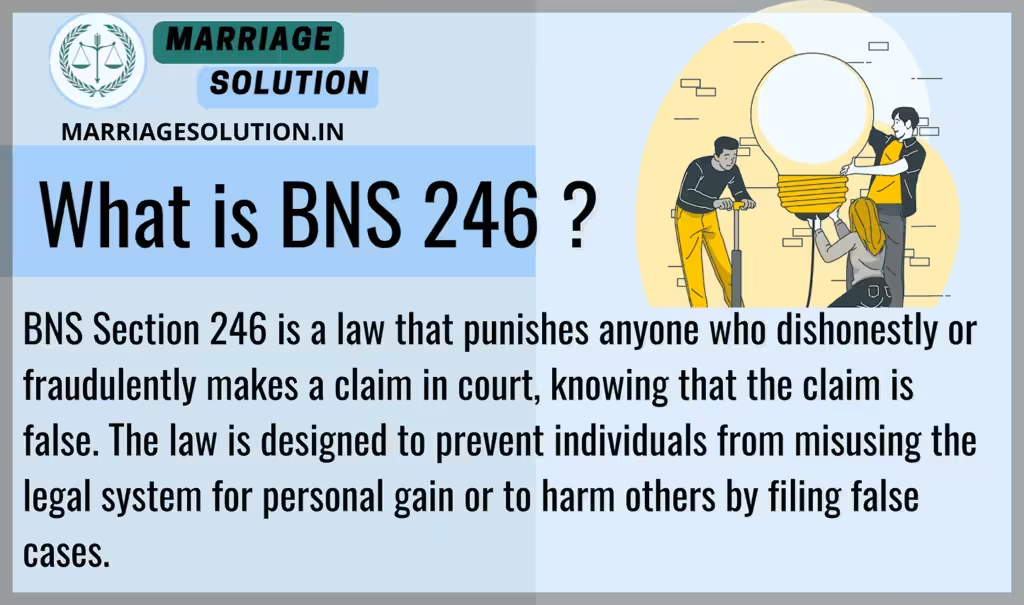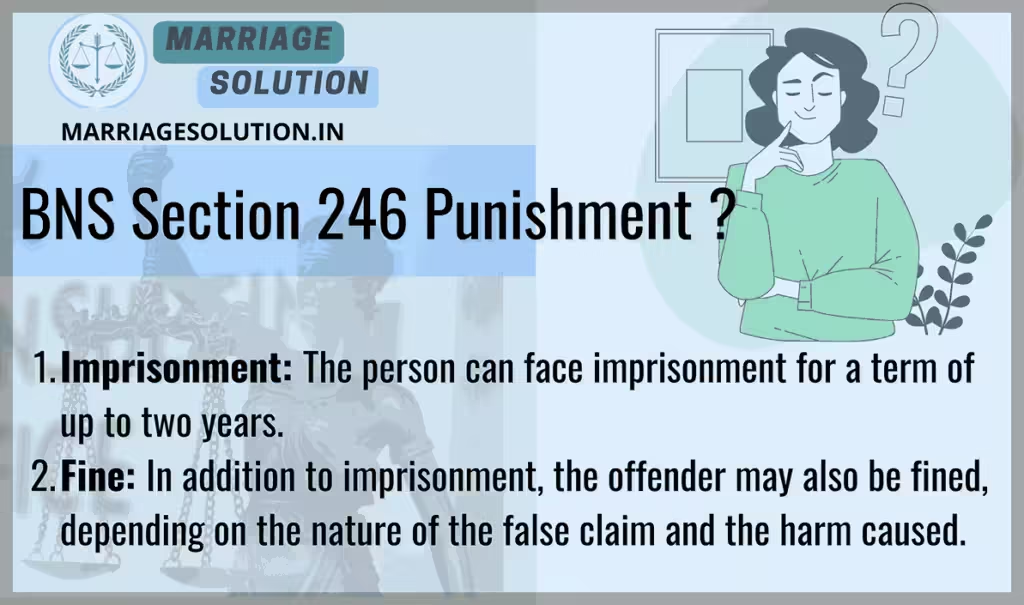Introduction of 246 BNS
Bharatiya Nyaya Sanhita (BNS) Section 246 punishes the dishonest practice of making a false claim in court with intent to injure, annoy or harm another. The provision targets people who misuse the judicial process by filing or pressing claims they know to be false — whether to harass a rival, cause delay, or obtain an unfair advantage. By criminalising such conduct, BNS 246 protects honest litigants and preserves the dignity and efficiency of courts.
The Bharatiya Nyaya Sanhita (BNS) Section 246 replaces the old Indian Penal Code (IPC) Section 209.
What is BNS Section 246 ?
BNS Section 246 is a law that punishes anyone who dishonestly or fraudulently makes a claim in court, knowing that the claim is false. The law is designed to prevent individuals from misusing the legal system for personal gain or to harm others by filing false cases.

Under Section 246 of the bns act 2023
“Whoever dishonestly or fraudulently makes a false claim in any Court, knowing such claim to be false, with intent to injure or annoy any person, shall be punished with imprisonment which may extend to two years, and shall also be liable to fine.”
1. Meaning of “False Claim in Court”
- This section covers cases where a person knowingly files or asserts a claim that is false in a court of law.
- The claim must be made dishonestly or fraudulently, not by mistake.
- The purpose of such a false claim is usually to cause harm, loss, or annoyance to another party.
2. Who is Covered?
This law applies to:
- Plaintiffs or complainants who file a knowingly false suit or application.
- Defendants who raise false counterclaims to delay or harass.
- Any party to a case that deliberately asserts a false right or obligation in court.
3. Nature of the Offence
- Non-Cognizable → Police cannot arrest without magistrate’s order.
- Bailable → Accused has the right to seek bail.
- Non-Compoundable → Cannot be settled privately between parties.
- Triable by Magistrate of the First Class → Lower criminal courts handle the trial.
4. Examples of BNS Section 246
- Example 1: A person files a case claiming ₹1,00,000 from his neighbour, knowing well that no such debt exists. → Punishable under Section 246.
- Example 2: Someone falsely accuses a colleague of owing rent in order to harass them in court. → Covered under this section.
- Example 3: If a person files a claim they genuinely believe to be true, but it turns out to be wrong, it is not punishable, since there was no dishonest intent.
5. Punishment under BNS Section 246
- Imprisonment: Up to 2 years.
- Fine: In addition to imprisonment, fine may be imposed.
- Both: Court may award both imprisonment and fine, depending on seriousness.
6. Importance of BNS Section 246
- Prevents misuse of courts by false or malicious litigants.
- Protects innocent parties from harassment and false claims.
- Preserves the dignity and credibility of the judiciary.
- Acts as a deterrent against malicious or vexatious litigation.
Section 246 BNS Overview
BNS Section 246 is a law that punishes anyone who knowingly makes a false claim in court with the intention of causing harm or annoyance to another person. This section is meant to stop people from abusing the legal system by filing dishonest or fraudulent claims that they know are false.
10 Key Points of BNS Section 246
- False Claim in Court:
- BNS Section 246 applies to cases where a person deliberately makes a false claim in a court of law. This means the person knows their claim is not true, but they make it anyway to deceive the court or harm another person.
- Intention to Injure or Annoy:
- The key part of this section is the intention behind the false claim. The person must have the intent to injure or annoy the other party involved in the case. This could be done to cause legal trouble, financial loss, or emotional distress.
- Fraudulent or Dishonest Behavior:
- The person making the false claim must act fraudulently or dishonestly. Fraudulent behavior involves intentional deception, while dishonesty refers to knowingly acting in a way that is wrong or unethical. Both actions are punishable under this section.
- Punishment for False Claims:
- If a person is found guilty under BNS Section 246, they can be sentenced to up to two years in prison. The length of the sentence depends on the severity of the false claim and the harm it caused.
- Liable to Fine:
- In addition to imprisonment, the offender may also have to pay a fine. The amount of the fine is decided by the court based on the nature of the false claim and the damage it caused.
- Bailable Offense:
- BNS Section 246 is a bailable offense, meaning that the person accused of the crime can apply for bail and be released from custody while the case is being heard.
- Non-Cognizable Offense:
- This section is classified as non-cognizable, meaning the police cannot arrest the accused without a warrant. The case has to go through the legal process, and the court must issue an order for further action.
- Triable by Magistrate of the First Class:
- Cases under BNS Section 246 are handled by a Magistrate of the first class, which means that this type of case is considered serious but is handled at the lower magistrate court level.
- Non-Compoundable Offense:
- BNS Section 246 is non-compoundable, meaning that the parties involved in the case cannot settle the matter privately or withdraw the case. The court must decide on the case, and the legal process cannot be stopped by the parties involved.
- Focus on Preventing Legal Misuse:
- The primary objective of BNS Section 246 is to prevent the misuse of the legal system by individuals who make false claims for personal gain or to harm others. This section acts as a deterrent for people who think they can get away with dishonest behavior in court.
Examples of BNS Section 246
- Example 1:
- Rajesh files a case in court claiming that his neighbor, Suman, has stolen his motorcycle, knowing very well that Suman did no such thing. Rajesh made the claim only to harass Suman because of a personal dispute. Rajesh’s false claim is covered under BNS Section 246.
- Example 2:
- Meena falsely claims in court that her colleague, Ravi, owes her ₹1 lakh, even though she knows that Ravi never borrowed any money from her. Meena does this out of spite to cause trouble for Ravi. This is a fraudulent claim, and she can be punished under BNS Section 246.
BNS 246 Punishment
- Imprisonment: The person can face imprisonment for a term of up to two years.
- Fine: In addition to imprisonment, the offender may also be fined, depending on the nature of the false claim and the harm caused.

BNS 246 bailable or non bailable ?
Yes, BNS Section 246 is a bailable offense, meaning the accused has the right to apply for bail while awaiting trial.
Comparison table — BNS 246 vs IPC 209
| Section | What it Means | Punishment | Bail | Cognizable? | Trial By |
|---|---|---|---|---|---|
| BNS Section 246 | Deals with anyone who dishonestly or fraudulently makes a false claim in court, knowing it is false, with intent to injure or annoy another person. | Imprisonment up to 2 years, or fine, or both — depending on severity and intent. | Bailable | Non-Cognizable | Magistrate of the First Class |
| IPC Section 209 (Old) | Covered those who made false claims in court with intent to injure or annoy others — the original rule against malicious litigation under IPC. | Same punishment — imprisonment up to 2 years, or fine, or both. | Bailable | Non-Cognizable | Magistrate of the First Class |
| Key Difference: BNS 246 replaces IPC 209 with clearer wording and broader coverage — including false electronic filings or digital claims. The punishment and nature remain identical, but BNS 246 modernises the law to better tackle dishonest or malicious litigation in today’s judicial system. | |||||
BNS Section 246 FAQs
What is the main focus of BNS Section 246?
BNS Section 246 focuses on punishing individuals who fraudulently or dishonestly make false claims in court with the intention of harming or annoying someone else.
What is the punishment under BNS Section 246?
The punishment includes imprisonment for up to two years and a fine, depending on the severity of the false claim.
Is BNS Section 246 a bailable offense?
Yes, it is a bailable offense, meaning the accused can apply for bail while awaiting trial.
Who can trial cases under BNS Section 246?
Cases under this section are triable by a Magistrate of the first class.
Is BNS Section 246 a compoundable offense?
No, it is a non-compoundable offense, meaning the parties cannot settle the matter privately without court involvement.
Does BNS Section 246 apply only to civil cases?
No, it applies to any false claim made in court, whether in civil or criminal matters, as long as the intent is fraudulent or dishonest.
Conclusion
BNS Section 246 serves as a clear warning: the courtroom is not a tool for spite or fraud. By penalising knowingly false claims made to injure or annoy others, the law protects citizens from malicious litigation and upholds the integrity of judicial process. With penalties of imprisonment and fine, the provision deters abuse, safeguards honest parties, and ensures that courts remain a place for genuine disputes—not manufactured grievances.
Need Legal Support?
If you are dealing with court cases, marriage problems, or any other legal issue, our team at Marriage Solution – Lawyer Help is here for you. Simply fill out our quick online enquiry form, and we’ll connect you with the right legal expert to support your needs.
Finished with BNS 246 ? Continue exploring the next provisions of the Bharatiya Nyaya Sanhita (BNS), 2023. Each section includes explanations, examples, and plain-language breakdowns for easy understanding.
- 247 BNS : Fraudulently obtaining decree for sum not due.
- https://marriagesolution.in/bns_section/247-bns/
- BNS 248 : False charge of offence made with intent to injure.
- https://marriagesolution.in/bns_section/bns-248/
- 249 BNS : Harbouring offender.
- https://marriagesolution.in/bns_section/249-bns/
- BNS 250 : Taking money, gifts, or any benefit to protect an offender from being punished.
- https://marriagesolution.in/bns_section/bns-250/
- BNS 251 : Offering money, gifts, or giving back property in return for hiding or protecting an offender from punishment.
- https://marriagesolution.in/bns_section/bns-251/
Full IPC Section List: https://marriagesolution.in/ipc-section-list
All Indian Law & Blogs: https://marriagesolution.in/indian-law/
Full BNSS Section List: https://marriagesolution.in/bnss_section-list
